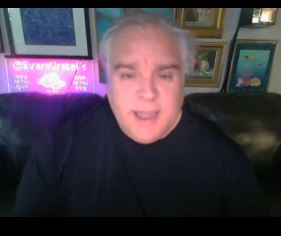Thought Leadership Studio Podcast Episodes:
Evan Kirstel Interview - Using Social Media for Thought Leadership
Episode Seventeen: Learn how to use social media for thought leadership from B2B thought leader and top technology influencer Evan Kirstel.

#contentmarketing, #influencermarketing, #insight, #interviews, #marketing, #marketresearch, #socialmedia, #thoughtleadership, #thoughtleadershipmarketing, #visibleleadership
Or Click here to listen or subscribe on appWhat this episode will do for you
- Gain insights into using social media for thought leadership from a social media master: Evan Kirstel.
- Understand common barriers in social media implementation and how to overcome them.
- Learn how Evan built a social audience of 470K followers.
Interview of B2B thought leader and top technology influencer Evan Kirstel.
Evan has built an organic social reach in the tens of millions within a decade. Brand24 called him the 4th Most Engaging Digital Marketer. He has worked with B2B tech bands like 3M, Intel, AT&T Business, Samsung, Qualcomm, HPE, Telefonica, Citrix and Ericsson. Evan is also a Forbes Business Council Member and Contributor and is the co-founder of EVIRA Health.
Learn more about Evan and his work at his website EvanKirstel.com.
Following are just a few curated snippets from our conversation, lightly edited for clarity. Listen to the podcast with the player above or on your favorite podcast app for the full conversation.
Overcoming Corporate Hurdles to Social Media Engagement.
Chris McNeil: How do you advise clients, when they face hurdles in getting engaged in social media?
 Evan Kirstel: Frankly it's loosening up a little bit. I mean, you know, there's so many big brands, particularly tech brands, who are so narrow in their thinking that they put such limitations and policies and practices and legal handcuffs on themselves about what they can or can't do -or what's "on brand" versus what's "off brand" - that they come off as completely constricted and artificial. And, their employees aren't comfortable engaging and their executives sort of hide behind the curtain. And the result is they don't get that reach and engagement and goodness that comes from putting themselves out as an organization on social media. So it's a real loss. I mean, I just had a client recently who said, oh, our new policy is "We can only do recorded, approved videos. We can't do anything live. "
Evan Kirstel: Frankly it's loosening up a little bit. I mean, you know, there's so many big brands, particularly tech brands, who are so narrow in their thinking that they put such limitations and policies and practices and legal handcuffs on themselves about what they can or can't do -or what's "on brand" versus what's "off brand" - that they come off as completely constricted and artificial. And, their employees aren't comfortable engaging and their executives sort of hide behind the curtain. And the result is they don't get that reach and engagement and goodness that comes from putting themselves out as an organization on social media. So it's a real loss. I mean, I just had a client recently who said, oh, our new policy is "We can only do recorded, approved videos. We can't do anything live. "
And it's a shame because live gets 10, 20, 50 X more reach than prerecorded, highly polished, edited, videos that you see out there from corporations. And so, you know, it's a real challenge, not just for marketing, but for companies in general, right? How do you embrace these younger generations of workers? How do you allow them to be their authentic selves while adhering to corporate practices and policies and programs and, part of that whole return to work return to the office phenomenon. So, you know, it's all part of the same theme, I think.
Chris McNeil: Do you think it's a generation gap issue where above a certain age, people didn't grow up with the internet?
Evan Kirstel: There is a generational shift, but I think it might be even more nuanced than that. Like, you know, my son's 17, there's this gen Z who actually don't put themselves out there as much. It's interesting - I mean, my son and his friends, they're all private on Instagram, they're all using messenger and, you know, you know, Snapchat and they're not putting out their personal lives.
So I don't know, I don't know what to make of it. And a lot of older, middle age and above are actually being more social now than we've ever seen before. So I think the pandemic has really rewritten a lot of the "rules of normal societies" and how we're all engaging and interactive. I think we have to kind of rediscover ourselves to some degree in this new age. And I don't think the traditional stereotypes really apply much anymore.
Chris McNeil: So what do you do when you run into an organization that's very top-down and they want to be successful on social, but fit that archetype of centralized decision making behind closed doors? Maybe with an attitude of "I want to delegate all this and just have someone make it happen." I guess you'd see that as a barrier to the authenticity?
Evan Kirstel: It's, a barrier ... a potential barrier. I mean, you know, in tech it's particularly a barrier because we live and breathe these platforms now and you only have to say, "Look at what your peers, your competitors, your, your colleagues and other verticals are doing."
Look at Mark Benioff from Salesforce. I mean, he's right out there on the bleeding, the cutting edge of social and digital and societal good ... or Michael Dell, who's a founder, the CEO of course, of Dell, is out there with his own Twitter account. So if you're not doing it, you know, your competition or your peers are.
And you know, they're not doing it for kicks and giggles, they're, they're gaining business or competitive edge or mind share or thought leadership. I mean, just look at Tesla with what Musk is doing. I mean, the guy has a hundred million followers,
Chris McNeil: And Tesla has a zero ad budget.
Evan Kirstel: Tesla has like 10 million (followers). Yeah. Right. So shenanigans and anti-society, you know, it's a tremendous marketing advantage.
Social Media For Gaining Audience Insight.
Chris McNeil: How much emphasis do you put on using social media as a way to gain insight into how your audience thinks?
Evan Kirstel: Wow, that, that's a really good question. I never thought of that. I mean, there is this great feedback loop in terms of comments and replies and likes and shares, and you can see what works and doesn't work and, uh, yeah, it exposes a lot. And there even ways to solicit feedback from your audience now. With things like polls on Twitter, you can ask questions and get, you know, feedback at scale. And LinkedIn has a polling feature. There are ways to look at analytics and keywords and hashtags to see what your audience is interested in and who they are. So yeah, constantly, querying your, your audience for feedback and direction is, is a good thing. And it helps you really attract those fans, not just followers, sure, of your content and your work and what you're doing. It's a virtuous circle when you really put through favorite your content and they like it and share it, it just builds, uh, you know, that, that audience, that intensity even more.
I would say it's catering, but definitely know your audience. My audience are techies and geeks and CTOs and sure. Analysts and median journalists. And so I, you know, I make sure I'm somewhat on topic. You know, I don't go off on tangents and rants on stuff, uh, on a day to day basis, but try to serve up content that I think is interesting to me, but aligned with kind of the audience I build.
On Balancing Content Creation and Content Curation.
Chris McNeil: What do you think is a good balance of content creation versus curation?
Evan Kirstel: That's a great question, man. You're, up on the questions. I'd say, um, for me it's about 50-50. You know, when I started my Twitter account, I was mainly curating and sharing and attaching myself to stories and adding color commentary. And that's great. But if you really want to build your own brand, your personal brand and your own thought leadership, you need to put out your content, whether it's written word blogging and or spoken word with podcasting or podcasts or video work with live or recorded video. You need to put out your own own point of view. And I think that becomes even more important over time.
Are Webinars Still Relevant for Thought Leadership Marketing?
 Chris McNeil: What do you think about webinars as a way to build an audience and sales for, for example, a tech company that has an innovative app that they want to introduce to the market and that has an audience of tech people?
Chris McNeil: What do you think about webinars as a way to build an audience and sales for, for example, a tech company that has an innovative app that they want to introduce to the market and that has an audience of tech people?
Evan Kirstel: Yeah, no one wants to attend another webinar, to be honest.
Chris McNeil: Yeah, sure...I'm curious. Is this (webinars) still a thing? Or what do you think their place is?
Evan Kirstel: But I think doing a webinar plus livestream plus live tweeting or live blogging the content is a great strategy. So people don't necessarily have to sign up and give you that email address, but they can. And, alternatively, people can watch and view it on the open web, through a live interface with no signups and no strings attached. So I think there are smarter ways to do webinars than just like the traditional "go to webinar" format that gets 25 people to sign up and marketing ticks the box saying, "okay, I got, got 25 leads". That's really kind of, I think pretty old fashioned way of looking at your, your audience.
Chris McNeil: So you would stack techniques on top of each other that way?
Evan Kirstel: Yeah. Do the webinar, every slide goes out as a live tweet. You live stream the webinar in addition to recording it and, you know, you put the content on everywhere. Don't, don't make it behind a gate where I have to give you all my contact info, you know. If someone volunteers that, great. And I think email marketing is really part of that, but, you know, get your content out there in all the platforms, not just on some gated community.
Chris McNeil: So as a part, as a piece of the strategy, certainly not by itself...
Evan Kirstel: Yeah, and I think some of the old school platforms just aren't very good. Like some of these webinar platforms need updating, they're not very fresh and innovative. And you know, it's, people are watching, it's putting up PowerPoints, and there's really no two way engagement. So some of the Zoom webinars have been more interesting and more participative. Some of the newer tools allow more interaction and that sort of thing, but, you know, B2B is, is still a pretty quiet, old way as a way of doing things... it's pretty old fashioned. So it's not going away.
(Again, above is just a few curated and lightly edited snippets from the interview. Listen to the podcast for the full interview.)
***************************************
Free Stuff and Offers Mentioned in Podcast
***************************************